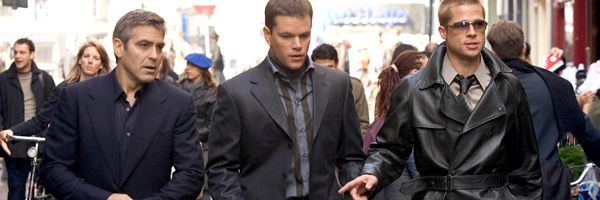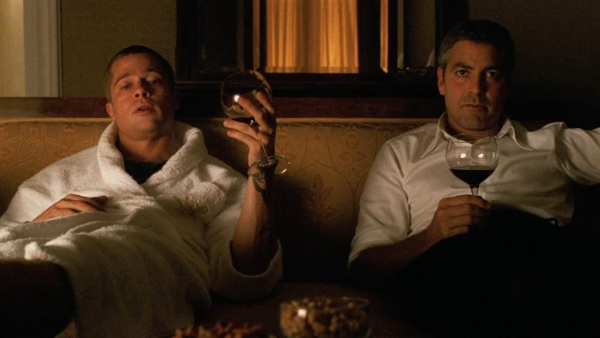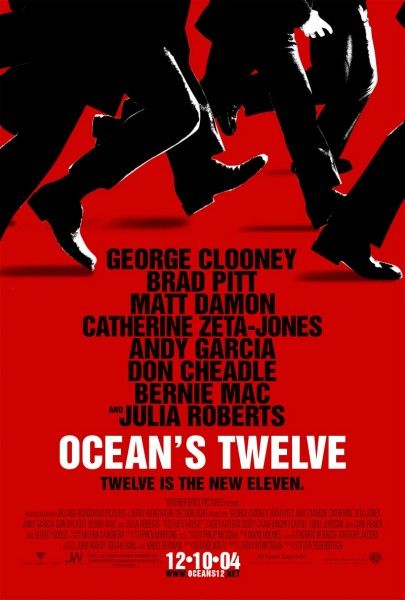Steven Soderbergh’s Ocean’s Eleven is a blast, and an infinitely rewatchable movie. But it’s so light and breezy that perhaps we all thought a sequel would be easy. After all, you’ve got a charismatic cast and all you have to do is make them stage an elaborate heist. But Ocean’s Twelve rested entirely on not only the charisma of the cast and Soderbergh’s direction, but showing them as out of their depth. The guys who had managed to rob the Bellagio spend the entire movie with a gun to their heads, trying to find a way to steal $197 million, and they’re repeatedly thwarted. And then, when it’s time to finally get to the big heist, it turns out it was nothing but a swap job. If you look at the movie as a heist film, it’s fairly underwhelming.
And yet that heist element was never really put forward. If you look at the structure of the film, Soderbergh is largely uninterested with heists that work and instead wants to up the ante with heists that fall apart. If Ocean’s Eleven is everything going according to plan with a few hiccups along the way, Ocean’s Twelve is everything falling apart constantly. The fact that the film rests on a swap job makes sense when you look at the other heists. You’ve got the raised building heist where they get beat by the Night Fox. You’ve got the museum heist where they don’t even get in the door before most of the crew gets pinched. And then you’ve got the Julia Roberts “impersonation” that basically falls apart before they can even get to the museum.
If you were looking for Ocean’s Twelve to be like Ocean’s Eleven but in Europe, you probably see the movie as a disappointment. And to be fair, the script is a bit haphazard to say the least as it tries to weave in a surplus of double-crosses, reveals, twists, and surprises. The reason why people dislike the film isn’t a mystery because it’s so different from its predecessor, but it should be applauded and recognized for what it’s trying to do, which is to break the mold of the first film while retaining its charm.
Ocean’s Twelve works so much better when you see it as a hangout film where everyone is fumbling their way through the motions. Everyone still has their special set of skills, but Soderbergh basically decided to blow up the original and see if he could piece it back together in a new and interesting way. By resting more on European cinematic influences and letting his cast be an even bigger group of oddballs, it works magnificently.
On my most recent rewatch, I had forgotten how funny the film is, and how wry it can be with its comedy. The freeze-frame on Rusty’s face when he realizes Isabel has stolen his phone is perfect, and it’s great watching the group bicker when you know there’s no enmity between them. While the first movie is about a crew coming together, the second movie feels like it’s more about friendship and the weirdness and uniqueness that comes from this group of people. This emphasis allows the movie to zig and zag in unexpected and delightful ways.
The strengths of Ocean’s Twelve are made even more clear by the simplicity of its sequel, Ocean’s Thirteen. There’s nothing particularly wrong with Thirteen, but it doesn’t stay with you like the first two movies. It almost feels like a reluctant picture with Soderbergh going back to Eleven and simply doing another big casino heist. There’s a large sense of “been there, done that” that deprives the film of its energy despite the cast still firing on all cylinders. It’s a fun movie, but a forgettable one whereas Twelve actually takes big swings from start to finish.
Ocean’s Twelve may not be a film that works for you, and if you want it to be like Ocean’s Eleven, it never will be. But if you look at the film on its own merits and see what it’s trying to do, you’ll find it a delightful and bold sequel that deserves more recognition and acclaim than it has received.



